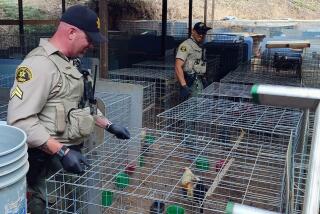SAN FERNANDO : Ostrich Theft Suspect Pleads Not Guilty
- Share via
A Sunland man accused of stealing seven African black ostriches from a Canoga Park hatchery where he had worked pleaded not guilty Tuesday to charges of burglary and grand theft at his arraignment in San Fernando Municipal Court.
Authorities allege that Scott Daniel Mitchell, 29, stole a total of seven ostrich chicks from Multi Industries, a company that incubates and hatches ostrich eggs imported from Namibia in two separate instances. He was arrested on Aug. 9 after auto theft detectives stumbled upon four of the 4 1/2-foot-tall chicks in the back yard of one of Mitchell’s friends.
Mitchell took four of the chicks while he was employed at Multi Industries and later broke into the company and stole three more chicks after he was fired for failing to keep proper records on the birds, said Linda Greenberg, the deputy district attorney assigned to the case.
Defendants usually enter not-guilty pleas at arraignments, Greenberg said, so the possibility of a plea bargain arrangement still exists. Mitchell is now scheduled for a preliminary hearing on Sept. 10.
All seven birds have been recovered, three from a La Crescenta man who apparently bought the birds from Mitchell for $2,500 and turned them in after seeing news reports about the case.
According to Greenberg, Mitchell faces a maximum of three years and eight months in prison and a fine of up to $10,000 if convicted of both charges.
“The thing that makes this such an important case is the risk to the chicken and duck population in California,” Greenberg said. “These birds were taken from quarantine and in that respect we’re treating it very seriously.”
The U. S. Department of Agriculture mandates ostriches be quarantined for 30 days to insure they are free of Newcastle disease, which can halt egg production in commercial poultry flocks.
Greenberg said the case is also significant because the birds were valued at more than $40,000.
“That’s not chicken feed,” Greenberg said. “He had breeding pairs, which are very valuable.”
More to Read
Sign up for Essential California
The most important California stories and recommendations in your inbox every morning.
You may occasionally receive promotional content from the Los Angeles Times.













